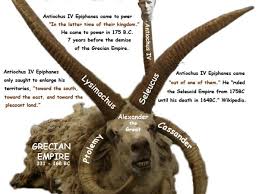Click here to open the passage in a new window.
Just when we thought Daniel couldn’t get any more confusing, when we perhaps mused, “Yes, I know something from Daniel 12 – resurrection, wise people shining like stars …”, we encounter these difficult verses. Let’s try to make some sense out of it.
Firstly, verses 1-4 are the final part of the narrative which began back in 10:20. Many people locate the events of these verses in the end times, after Jesus’ return. But such an interpretation is not necessary (although of course entirely plausible). It could simply mean: “Really bad times are coming, but your people will be rescued if God knows them. There will be a resurrection of all people, so even if they have died during the bad times, they will live again eternally. Wise people will shine, and those who make others righteous will shine. Knowledge will increase. But that’s enough for now, shut the book.”
Daniel sees two more men, one on either side of the river, probably representing the saints who trust God, who are suffering. They ask the divine messenger, “How long will it go on?” (or more literally, “Until when is the end of the wonders?”). He responds with the same words as in 7:25. It’s going to be a long time, but, in a sense, it will end before it’s fully completed – that is, the ‘half’ signifies that evil will not have its way in the end. Huh? If you don’t understand, don’t worry, nor does Daniel. He asks for further explanation, but he is told once more that the book is closed and there is nothing more to be said.
However, he goes on: the evil will continue doing evil, and not understand; many others will be refined, and the wise will understand. Is Daniel wise? Are we as readers? I guess not, because no one understands the 1290 days or the 1335 days. There are about a thousand (pun absolutely intended) theories out there, but nothing satisfies. All we know is that there is something bad going to happen to God’s people, but they need to endure beyond it and wait for God to save them at the right time. The last word to Daniel is to keep going to the end, to rest (to die?), and to rise (to be resurrected?) to his inheritance at the end of days.
Jesus and John in Revelation pick up a lot of imagery from these chapters of Daniel. But let’s think how the original author understood it. His message is that God’s people are going to suffer and they need to endure. Even if they die, they need not fear, as long as they trust and fear God as their sovereign. Evil is not going to go away. But the wise, and those who bring about righteousness, will yet shine like stars in a velvet black sky. Most of us do not suffer as the original audience of this book did. And yet we continue to be battered by the problem of evil in the world, even when it doesn’t confront us directly in our own lives. The Book of Daniel calls on us to stand firm in the face of evil, to stand for righteousness, to continue trusting that God will save, even if after death.
There was a time in my life not too long ago when I felt absolutely crushed by what was going on, barely holding on, overwhelmed by feeling out of control. Much like Daniel and the people of God during the exile. At that time the lyrics of this song were a great encouragement to me: “Your world’s not falling apart, it’s falling into place; I’m on the throne”. It’s not entirely appropriate to Daniel and his situation, but maybe it will encourage you today.
Prayer: Lord God, there is so much in this world that I don’t understand. How long will this evil last? I am weak and confused. Please help me trust you, and to know that you are on the throne, that you are in control, especially when I am not.
[PS. There will be no new reading tomorrow. Take the time to catch up on anything you have missed. Next week we will begin looking at Deuteronomy.]



